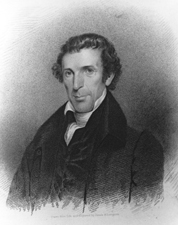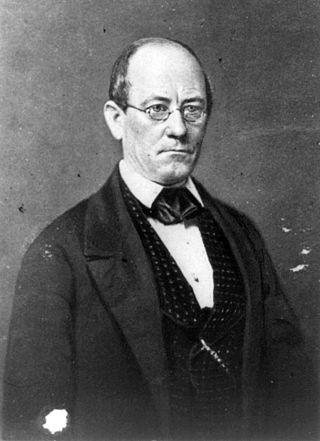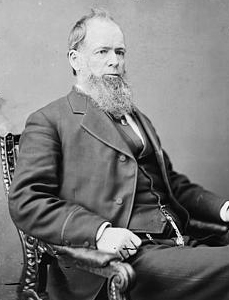Related Research Articles

Georgetown is a home rule-class city in Scott County, Kentucky, United States. The population was 37,086 at the 2020 census. It is the 6th-most populous city in the U.S. state of Kentucky. It is the seat of its county. It was originally called Lebanon when founded by Rev. Elijah Craig and was renamed in 1790 in honor of President George Washington. Historically, settlers were drawn to Georgetown for its Royal Spring.

Lexington is a city in, and the county seat of, Lafayette County, Missouri, United States. The population was 4,726 at the 2010 census. Lexington is in western Missouri, within the Kansas City metropolitan area, approximately 40 miles (64 km) east of Kansas City. It is the home of the Battle of Lexington State Historic Site, and of the former Wentworth Military Academy and College, which operated from 1880 to 2017.

William Taylor Barry was an American statesman, jurist and slave owner. He served as Postmaster General for most of the administration of President Andrew Jackson and was the only Cabinet member not to resign in 1831 as a result of the Petticoat affair.

John McAllister Schofield was an American soldier who held major commands during the American Civil War. He was appointed U.S. Secretary of War (1868–1869) under President Andrew Johnson and later served as Commanding General of the United States Army (1888–1895).

George Mortimer Bibb was an American lawyer and politician and the seventeenth United States Secretary of the Treasury. He was chief justice of the Kentucky Court of Appeals and twice represented Kentucky as a senator in Congress, serving from 1811 to 1814 and from 1829 to 1835.

James Barbour was an American politician, planter, and lawyer. He served as a delegate from Orange County, Virginia, in the Virginia General Assembly and as speaker of the Virginia House of Delegates. He was the 18th Governor of Virginia and the first Governor to reside in the current Virginia Governor's Mansion. After the War of 1812, Barbour became a U.S. Senator and the United States Secretary of War (1825–1828).

George Washington Custis Lee, also known as Custis Lee, was the eldest son of Robert E. Lee and Mary Anna Randolph Custis Lee. His grandfather, George Washington Parke Custis was the grandson of Martha Dandridge Custis Washington. He served as a Confederate general in the U.S. Civil War, primarily as an aide-de-camp to President Jefferson Davis, and succeeded his father as president of Washington and Lee University in Lexington, Virginia.

Daniel Harvey Hill, commonly known as D. H. Hill, was a Confederate general who commanded infantry in the eastern and western theaters of the American Civil War.

John Letcher was an American lawyer, journalist, and politician. He served as a Representative in the United States Congress, was the 34th Governor of Virginia during the American Civil War, and later served in the Virginia General Assembly. He was also active on the Board of Visitors of Virginia Military Institute.

Nathaniel Herbert Claiborne was a nineteenth-century Virginia lawyer and planter, as well as an American politician who served in both houses of the Virginia General Assembly and in the United States House of Representatives (1825-1837).

John Cleveland Robinson was an American soldier in the United States Army. Robinson had a long and distinguished military career, fighting in many wars and culminating his career as a brigadier general and brevet major general in the Union Army during the American Civil War.
Wentworth Military Academy and College was a private two-year military college and high school in Lexington, Missouri, one of six military junior colleges in the United States. The institution was founded in 1880 and closed in 2017.

The Randolph family of Virginia is a prominent political family, whose members contributed to the politics of Colonial Virginia and Virginia after statehood. They are descended from the Randolphs of Morton Morrell, Warwickshire, England. The first Randolph in America was Edward Fitz Randolph, who settled in Massachusetts in 1630. His nephew, William Randolph, later came to Virginia as an orphan in 1669. He made his home at Turkey Island along the James River. Because of their numerous progeny, William Randolph and his wife, Mary Isham Randolph, have been referred to as "the Adam and Eve of Virginia". The Randolph family was the wealthiest and most powerful family in 18th-century Virginia.

Colonel James McBrayer Sellers was a highly decorated Marine in World War I, and served as commandant, superintendent and president of Wentworth Military Academy in Lexington, Missouri, from 1920 to 1990.
Colonel Lester Bascom Wikoff (1893–1978) served as the fifth Superintendent of Wentworth Military Academy in Lexington, Missouri, from 1960 to 1971.
Colonel James McBrayer Sellers Jr., served as Superintendent of Wentworth Military Academy in Lexington, Missouri from 1973 to 1990.
Sandford Sellers (1854–1938) was the Principal, Superintendent and President of Wentworth Military Academy from 1880 to 1935.

Robert Murphy Mayo was a Virginia lawyer, Confederate officer and politician who served in the Virginia House of Delegates and briefly in the United States House of Representatives as a member of the Readjuster Party.

Scott Shipp was an American military figure, Confederate States Army officer, educator and educational administrator born in Warrenton, Virginia. He was the second superintendent of the Virginia Military Institute, briefly the president of Virginia Agricultural and Mechanical College and led the VMI Cadets at the Battle of New Market during the American Civil War.
William Wentworth Sellers was the fourteenth President of Wentworth Military Academy and College in Lexington, Missouri, serving from 2008 to 2013. He was the fourth generation of his family to head the school, following his great-grandfather Sandford Sellers, who led Wentworth from its founding in 1880 until 1923, his great-uncle Sandford Sellers, Jr. (1923–1933), his grandfather James M. Sellers (1933–1960), and his father James M. Sellers, Jr. (1973–1990). He is also a direct descendant of Academy founder Stephen G. Wentworth. Sellers currently serves as President of the Journey Through Hallowed Ground National Heritage Area.
References
- The Story of Wentworth, by Raymond W. Settle, 1950, Spencer Printing Co., Kansas City.
- History of Wentworth Military Academy, by James M. Sellers, Jr., 1984.
- Wentworth Trumpeter, 1893–2007.
- Wentworth Military Academy, 125th Anniversary. Lil Touch Publishing. 2005.